Social Media Harm Lawsuit: Protecting Victims and Seeking Justice
- Last Updated: October 20th, 2025
Key Takeaways
Understand the inherent rights of those harmed by social media platforms and how these individuals can seek legal recourse to address their grievances.
Delve into the responsibilities of social media companies in ensuring user safety, and the instances where they might be held liable for neglect or direct harm caused to users.
Explore the procedural intricacies of pursuing a social media harm lawsuit, including gathering evidence, choosing the right legal representation, and navigating the complexities of the justice system.
Social Media Harm Lawsuit: Protecting Victims and Seeking Justice
Cyberbullying, especially among young users, has become a major concern due to the rise of social media platforms like Facebook and Instagram.
The recent Facebook papers have shed light on the potential psychological harm caused by online harassment.
Extensive research consistently demonstrates a clear correlation between cyberbullying and psychological harm, such as heightened levels of anxiety, depression, and even suicidal ideation.
This has led to an increase in social media addiction lawsuits and social media harm lawsuits.
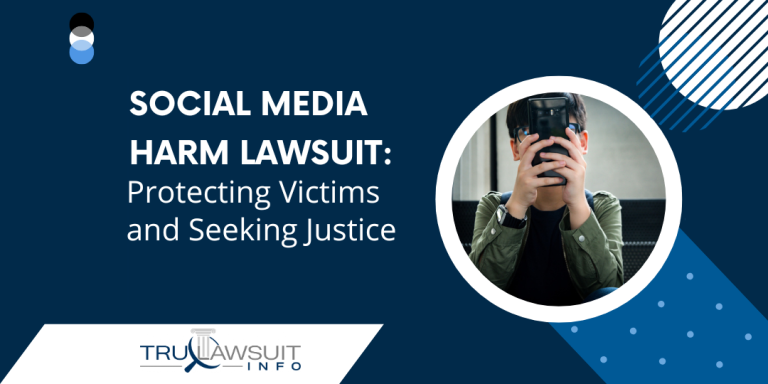
The psychological harm caused by these issues can be devastating, leading to eating disorders, suicidal thoughts, and side effects.
Victims may experience overwhelming feelings of sadness and isolation, resulting in a general deterioration in overall mental health and body image.
It is crucial to acknowledge that social media addiction lawsuits and cyberbullying extend beyond the confines of the virtual world, causing mental health problems and a mental health crisis with far-reaching effects on victims’ lives.
To effectively address social media addiction among young users, especially teens, it is imperative to explore and implement strategies that combat cyberbullying based on research.
Lawsuits Over Social Media Harm and Cyberbullying
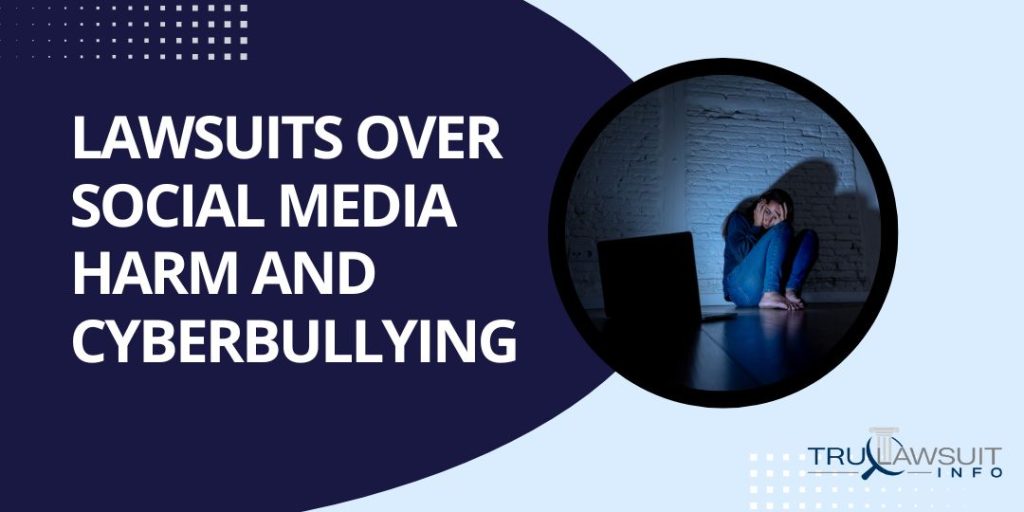
Teens and users of Instagram and Facebook are increasingly seeking legal recourse for the harm caused by cyberbullying on these social media platforms.
These lawsuits involve claims of defamation, invasion of privacy, and intentional infliction of emotional distress and are related to users and content on social media addiction.
Additionally, these lawsuits are connected to top-class actions.
The aim is to hold both individuals and social media companies, such as Instagram and Facebook, accountable for their actions or lack thereof, especially when it comes to the well-being of users, particularly teens.
The Surge in Lawsuits and the Impact on Teens
In recent years, there has been a surge in lawsuits related to social media harm on platforms like Instagram and Facebook.
These lawsuits often involve teenagers as the users affected by the harm.
With the rise of online attacks and personal injury caused by cyberbullying, users, especially teens addicted to social media like Facebook, are turning to the court system to seek justice.
These cases highlight the detrimental effects that cyberbullying, social media addiction, and excessive use of Instagram and Facebook can have on users’ well student’s mental health, well-being, and overall quality of life.
One common type of lawsuit involving defamation claims often arises from users of Facebook and Instagram who engage in eating-related content.
Victims who have had false information spread about them on Facebook and Instagram may file a lawsuit against those responsible for spreading the harmful content, especially if it relates to addiction to social media platforms like Facebook and Instagram.
Defamation on social media platforms like Facebook and Instagram can tarnish one’s reputation and have long-lasting consequences, making it a serious issue that needs to be addressed.
Social media addiction is a growing concern that exacerbates the problem.
Invasion of Privacy Claims and Challenges of Social Media Addiction
Another legal avenue pursued by victims of social media addiction is invasion of privacy claims involving Facebook and Instagram.
With the widespread use of Facebook and Instagram, addiction to these social media platforms can easily occur, leading to the sharing of personal information without consent.
This violation of privacy, caused by social media addiction, can cause significant emotional distress and damage one’s sense of security on platforms like Instagram.
Lawsuits targeting social media addiction and invasions on platforms like Instagram aim to protect individuals’ right to privacy in an increasingly interconnected world.
Furthermore, the intentional infliction of emotional distress is another basis for lawsuits related to harm caused by Instagram addiction.
Social media addiction, particularly on platforms like Instagram, often contributes to targeted cyberbullying attacks, causing significant emotional pain and suffering for the victims.
Victims of social media addiction, particularly on platforms like Instagram, may experience anxiety, depression, or even develop psychological disorders as a result of these relentless online attacks from individuals.
By holding perpetrators accountable through legal action, victims of social media addiction hope to find closure and prevent further harm on platforms like Instagram.
Legal Challenges for Social Media Companies and the Role of Instagram Addiction
Not only individuals but social media companies like Instagram are also facing legal challenges related to cyberbullying and social media harm.
These lawsuits hold both individuals and companies accountable for their actions.
Addiction to Instagram has led to harmful consequences.
Critics argue that social media platforms should take more responsibility in preventing bullying, protecting their users from social media addiction, and ensuring their online safety.
Lawsuits against social media companies often claim that they have not done enough to address cyberbullying or have failed to implement adequate measures to protect their users from social media addiction case others.
School districts have also become targets of lawsuits in cases where cyberbullying, often fueled by social media addiction, has occurred within educational settings.
Parents and victims may argue that the school district failed to take appropriate action to prevent or address the bullying, which may have been exacerbated by social media addiction, leading to further harm.
These lawsuits aim to highlight the importance of creating safe environments both online and offline, especially in relation to social media addiction.
The Connection Between Cyberbullying and Mental Health Injuries
Cyberbullying is a pervasive issue in today’s digital age, with the potential to inflict severe mental health injuries on its victims.
Studies have shown that the emotional harm caused by cyberbullying can lead to long-lasting psychological effects, including post-traumatic stress disorder (PTSD) and self-harm behaviors.
Negative Emotions and Psychological Impact
Victims of cyberbullying often experience a range of negative emotions, such as depression, anxiety, and low self-esteem.
The constant harassment and humiliation they endure through online platforms can take a toll on their mental well-being.
These individuals may find themselves trapped in a vicious cycle of negativity, unable to escape the torment inflicted upon them.
One of the most concerning outcomes of cyberbullying is the development of PTSD.
Similar to individuals who have experienced physical trauma, victims of cyberbullying can develop this disorder due to the emotional trauma they endure.
Flashbacks, nightmares, and intrusive thoughts about bullying incidents are common symptoms experienced by those with cyberbully-induced PTSD.
Risk of Self-Harm Behaviors
Furthermore, cyberbullying has been linked to an increased risk of engaging in self-harm behaviors.
The overwhelming feelings of helplessness and despair resulting from relentless online attacks can push victims toward harmful coping mechanisms.
It is crucial to address this connection between cyberbullying and self-harm behaviors promptly to prevent further harm.
In addition to PTSD and self-harm behaviors, some victims may develop body dysmorphia—a disorder characterized by an obsessive preoccupation with perceived flaws in one’s appearance.
Cyberbullies often target their victims based on physical attributes or use manipulative tactics that distort their perception of themselves.
This constant scrutiny can contribute to body dysmorphia development over time.
The impact of cyberbullying on mental health cannot be underestimated.
It is essential for parents, educators, and policymakers alike to recognize its detrimental effects and take proactive measures against it.
Providing support systems for victims, raising awareness about the consequences of cyberbullying, and implementing stricter regulations on online platforms are crucial steps toward combating this pervasive issue.
Settlements and Compensation in Social Media Harm Lawsuits
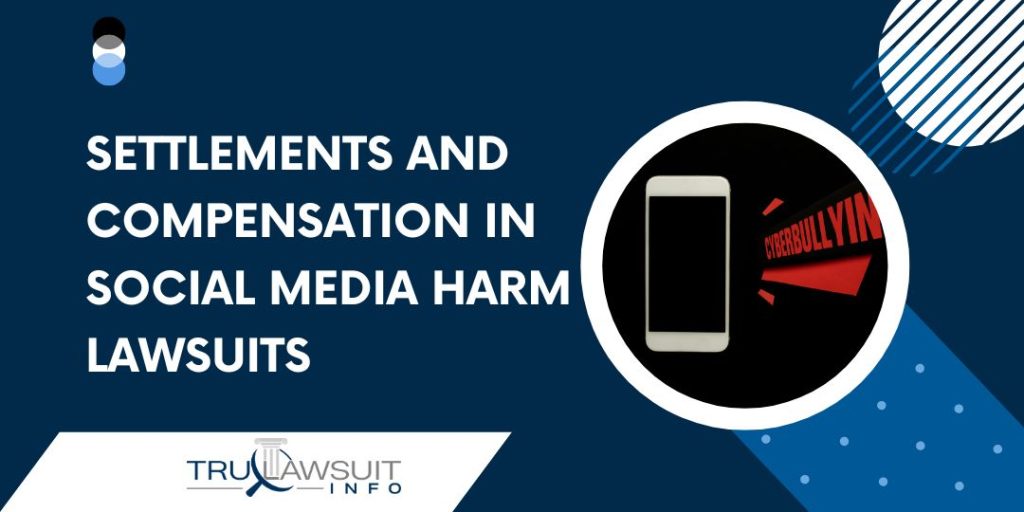
Victims who file social media harm lawsuits may seek compensation for various damages, including emotional distress, medical expenses, and loss of reputation.
In these cases, victims often experience significant emotional distress as a result of cyberbullying on social media platforms.
The constant harassment, threats, and humiliation can have long-lasting effects on their mental well-being.
They may suffer from anxiety, depression or even post-traumatic stress disorder (PTSD) due to the relentless online abuse they endure.
Seeking compensation for emotional distress is crucial as it acknowledges the psychological toll inflicted upon the victims.
Medical Expenses and Recovery
Medical expenses also play a role in determining the compensation sought by victims.
Cyberbullying can lead to psychological or physical harm, in some cases, such as self-harm or suicide attempts.
Victims may require medical treatment for injuries sustained or therapy to cope with the trauma they have endured.
Compensation for these expenses helps alleviate the financial burden placed on victims seeking recovery and healing.
Loss of reputation is another critical aspect addressed in social media harm lawsuits.
When false information or damaging content spreads rapidly across social media platforms, it can tarnish an individual’s reputation irreparably.
This damage can impact their personal relationships, professional opportunities, and overall quality of life.
Seeking compensation for loss of reputation in social media lawsuits aims to restore a sense of justice and mitigate the negative consequences that arise from cyberbullying incidents.
Factors Influencing Settlement Amounts
Settlements in these cases can vary widely depending on factors such as the severity of harm inflicted and the financial resources involved.
Social media companies are often held accountable for allowing cyberbullying to occur on their platforms.
As a result, they may be required to provide financial compensation to victims who file lawsuits against them.
The amount awarded as part of settlements depends on several factors:
- The severity of harm: The more severe the harm inflicted upon the victim, both emotionally and physically, the higher the potential settlement amount.
- Financial resources: If the social media company is financially robust, it may be more likely to offer larger settlements to victims.
- Legal representation: Victims who have skilled and experienced legal representation are more likely to negotiate higher settlement amounts.
Impacts on Social Media Companies and Policies
Some high-profile cases have resulted in significant monetary settlements as well as changes in platform policies regarding online safety.
For instance, several companies have faced lawsuits that led to substantial compensation for victims and prompted changes in their policies:
- In a notable case against a major social media company, a victim was awarded $10 million in damages due to the severe emotional distress caused by cyberbullying.
- This landmark settlement not only provided financial relief for the victim but also sent a strong message to other platforms about the importance of addressing online harassment.
Addressing the Consequences: Supporting Victims of Cyberbullying
Cyberbullying has become a prevalent issue in today’s society, particularly among children and students who are active users of online social networking and media platforms.
The effects of cyberbullying can be detrimental, leading to negative thoughts, behavioral changes, and even harm to one’s self-image.
It is imperative that we provide support systems for victims to help them cope with the consequences they face.
Providing Support Systems for Victims
Offering counseling services plays a vital role in helping victims heal emotionally.
By providing access to professional therapists or counselors, children can receive guidance and support in navigating their emotions and developing coping mechanisms.
Educational programs targeted at both students and parents can raise awareness about cyberbullying and equip them with the knowledge needed to identify signs of bullying behavior.
Social Media Harm Lawsuit: Implementing Proactive Measures
Prevention is key.
Schools, communities, and online platforms must work together to implement proactive measures that deter such incidents from occurring in the first place.
This involves creating a safe environment where children feel comfortable reporting instances of cyberbullying without fear of retaliation:
- Safe reporting mechanisms: Online platforms should establish clear channels through which victims or witnesses can report instances of cyberbullying anonymously.
- Strict policies: Schools should enforce strict anti-cyberbullying policies that clearly outline consequences for those engaging in such behavior.
- Parental involvement: Parents play a crucial role in supporting their children through these difficult times.
- Encouraging open communication with parents can foster trust and ensure that any signs or symptoms of cyberbullying are addressed promptly.
Fostering Emotional Resilience
Exposure to cyberbullying can have severe emotional repercussions on victims.
Therefore, it is essential to provide resources that help individuals build emotional resilience:
- Peer support groups: Creating safe spaces where victims can share their experiences and find solace in others who have gone through similar situations can be immensely beneficial.
- Self-esteem-building programs: Educational institutions can implement programs that focus on boosting self-esteem and promoting a positive self-image among students.
- Encouraging a stand against cyberbullying: Empowering children to take a stand against cyberbullying is crucial.
- Teaching them the importance of empathy, kindness, and inclusivity can help create a culture that rejects bullying behaviors.
Taking Legal Action: Steps to File a Social Media Harm Lawsuit
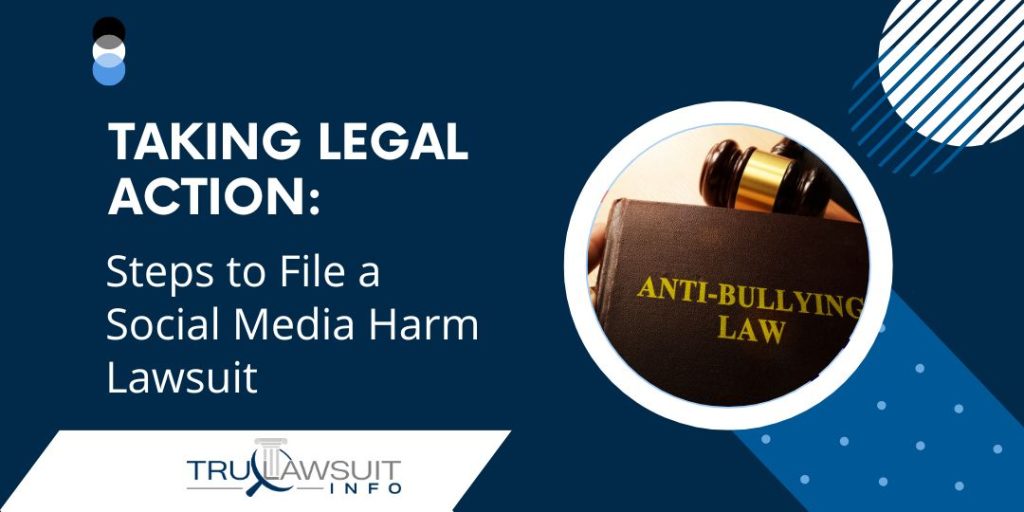
Victims considering legal action should consult with an attorney specializing in cyberbullying and social media harm cases.
These attorneys have the expertise and knowledge necessary to navigate the complexities of such lawsuits.
They can provide guidance on the specific laws and regulations that apply, as well as advise victims on their legal rights and options for seeking compensation.
Gathering Evidence for a Strong Case
The first step in filing a lawsuit involves gathering evidence of cyberbullying incidents.
Victims must document each instance thoroughly to strengthen their case.
This may include taking screenshots or saving messages that contain offensive content, threats, or harassment.
Such evidence is crucial in establishing the existence and severity of cyberbullying.
To support their claim, victims may need to document the emotional distress caused by cyberbullying.
This can be achieved through personal accounts detailing how the actions of the perpetrator affected their mental well-being.
Victims may also provide any relevant medical records that demonstrate psychological harm resulting from the cyberbullying incidents.
Steps in Filing a Cyberbullying Lawsuit
Once victims have gathered sufficient evidence, they can proceed with filing a lawsuit against those responsible for perpetrating cyberbullying on social media platforms.
The process typically involves several steps:
- Consultation with an Attorney: Victims should meet with an attorney specializing in cyberbullying cases to discuss their situation and determine if pursuing legal recourse is appropriate.
- Drafting a Complaint: The attorney will help victims draft a complaint outlining their social media addiction claim against the perpetrators involved in the cyberbullying incidents.
- Filing the Complaint: The complaint is then filed with the appropriate court, initiating legal proceedings against those responsible for causing harm through cyberbullying.
- Serving Notice: Once filed, copies of the complaint must be served to all parties named in it, informing them about pending legal action against them.
- Discovery Process: During this phase, both sides exchange information related to the case. Victims may be required to provide additional evidence or answer questions posed by the defendant’s legal team.
- Settlement Negotiations: In some cases, parties may attempt to reach a settlement agreement before going to trial. This involves negotiating terms that are agreeable to both parties and can result in compensation for the victim.
- Trial: If a settlement cannot be reached, the case proceeds to trial, where both sides present their arguments and evidence before a judge or jury.
- Verdict and Judgment: After the trial concludes, a verdict is reached, determining whether the defendant is liable for the cyberbullying harm suffered by the victim. If found liable, a judgment is issued, specifying any compensation awarded.
Seeking Justice for Victims of Cyberbullying and Social Media Harm
Pursuing legal action against perpetrators of cyberbullying sends a message that this behavior will not be tolerated.
In today’s digital age, cyberbullying has become increasingly prevalent, causing significant physical and psychological harm to its victims.
By taking legal action, victims can seek justice for the emotional distress and damage inflicted upon them.
Seeking Justice and Closure for Victims
Successful lawsuits can provide victims with a sense of justice and closure after enduring online abuse.
Being subjected to cyberbullying can have severe consequences on an individual’s mental health and self-esteem.
Initiating legal proceedings allows victims to regain control over their lives and demonstrate that they will not tolerate such mistreatment.
It also serves as a deterrent for potential bullies, sending a clear message that their actions will have consequences.
Holding both individuals and social media platforms accountable helps create safer online environments for everyone.
While it is crucial to address the actions of individual perpetrators, it is equally important to recognize the role that social media platforms play in facilitating cyberbullying.
These platforms must take responsibility for providing safe spaces for their users, especially vulnerable groups such as kids and teenagers.
Advocating for Better Security Measures
Taking legal action on behalf of victims also highlights the need for better security measures from social media services.
Companies should invest in robust algorithms and monitoring systems to detect instances of cyberbullying promptly.
By doing so, they can proactively identify harmful content or attempts by someone to harm others online.
In some cases, victims may choose to contact security services or law enforcement agencies when faced with severe cyberbullying incidents.
Reporting such incidents ensures that appropriate action is taken against the perpetrators while safeguarding potential future victims.
Support Organizations and Navigating Legal Processes
Seeking justice through legal means is not an easy task; however, there are organizations dedicated to helping victims navigate this process.
For instance, our team here at TruLaw provides support and guidance specifically tailored toward individuals dealing with cyberbullying issues.
It is essential to remember that anyone can fall victim to cyberbullying, regardless of age or background.
By taking legal action, victims not only help themselves but also contribute to the collective effort of creating a safer online environment for everyone.
The Link Between Social Media Addiction and Teenage Suicide
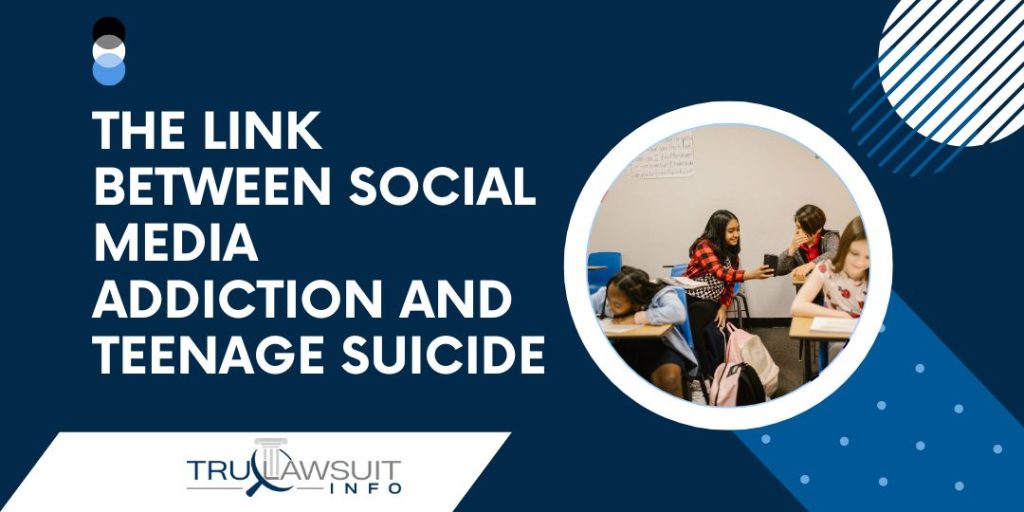
Excessive use of various social media accounts has been linked to increased rates of depression, anxiety, self-harm, and suicidal thoughts among teenagers.
Cyberbullying on social media platforms often exacerbates these negative effects on mental health.
Recognizing the connection between social media addiction, cyberbullying, and teenage suicide is crucial for prevention efforts.
Social media addiction is a growing concern among teenagers and young adults today.
With the widespread availability of smartphones and easy access to various social media sites, young people are spending more time than ever scrolling through their feeds.
This constant exposure to social media can have detrimental effects on their well-being.
Impact on Mental Health: Depression and Anxiety
Studies have shown that excessive social media use is associated with higher levels of depression and anxiety in teenagers.
The constant comparison to others’ seemingly perfect lives portrayed on a social media site can lead to feelings of inadequacy and low self-esteem.
Teenagers may feel pressured to conform to unrealistic standards set by influencers or peers they follow online.
Moreover, cyberbullying has become a prevalent issue on social media platforms.
Online harassment through hurtful comments, spreading rumors, or sharing embarrassing content can deeply impact a teenager’s mental health.
The anonymity provided by the internet often emboldens bullies who may not face consequences for their actions.
Vulnerable Teens at Risk
The combination of social media addiction and cyberbullying can be particularly dangerous for vulnerable individuals.
Teenagers who already struggle with serious mental health issues may find themselves trapped in a toxic cycle where they constantly seek validation from their online presence while being subjected to relentless bullying.
It is essential for parents, educators, and policymakers to address this issue proactively.
By promoting healthy digital habits and teaching teenagers how to navigate social media responsibly, we can help reduce the negative impact it has on their mental well-being.
Steps for Support:
Here are some steps we can take:
- Encourage open communication: Create an environment where teenagers feel comfortable discussing their online experiences without fear of judgment. Let them know they can come to you for support if they encounter cyberbullying or feel overwhelmed by social media.
- Set boundaries: Establish guidelines for screen time and encourage teenagers to take regular breaks from social media. Encourage them to engage in offline activities, spend time with friends and family, and pursue hobbies that bring them joy.
- Foster empathy and kindness: Teach teenagers the importance of treating others with respect both online and offline. Encourage them to stand up against cyberbullying by reporting abusive behavior and supporting their peers who may be targeted.
- Monitor online activity: Keep an eye on your teenager’s social media use without invading their privacy.
Legal Fees for Social Media Lawsuits: What to Expect
Legal fees for social media harm lawsuits can vary depending on factors such as the complexity of the case and the attorney’s experience.
It is important for victims to discuss legal fees upfront with their attorneys to have a clear understanding of the potential costs involved.
Some attorneys may offer free consultations or work on a contingency fee basis where they only get paid if they win the case.
This can be beneficial for victims who may not have the financial means to pay upfront legal fees.
By working on a contingency fee basis, social media lawyers are motivated to pursue the case vigorously since their payment is dependent on winning.
Understanding Fee Details:
When discussing legal fees with your chosen legal team, it is essential to ensure that you understand all aspects of the fee structure.
Ask questions about any additional costs that may arise during the course of the lawsuit, such as court filing fees or expert witness expenses.
Being aware of these potential expenses will help you avoid any surprises down the line.
In some cases, victims may be eligible for pro bono representation, where lawyers provide their services free of charge.
Pro bono representation is often available through organizations that focus on assisting individuals who have been affected by cyberbullying and other forms of social media harm.
If you are unable to afford legal fees but believe you have a strong case, it’s worth exploring pro bono options in your area.
Balancing Justice and Costs:
It’s crucial to remember that pursuing a social media addiction lawsuit involves more than just financial considerations.
Seeking justice and protecting your legal rights should always be at the forefront of your decision-making process.
While legal fees can add up, they are an investment in holding those responsible accountable for their actions and preventing future instances of cyberbullying and social media harm.
Conclusion: Insights into Cyberbullying and Social Media Harm Lawsuits
In conclusion, the rise of cyberbullying and social media harm has led to an increase in lawsuits seeking justice for victims.
As we have explored in this blog post, these lawsuits address the serious consequences of cyberbullying on mental health and overall well-being.
Settlements and compensation play a crucial role in supporting victims and holding responsible parties accountable.
If you or someone you know has experienced cyberbullying or social media harm, it is important to take action.
By understanding the steps involved in filing a lawsuit and seeking legal support, you can fight for justice.
Remember, support systems are available to help victims navigate through the challenging process.
Frequently Asked Questions
-
Yes, you can file a lawsuit for cyberbullying if you have been a victim of online harassment or harm caused by another person’s actions.
It is essential to gather evidence such as screenshots, messages, or any other documentation that proves the bullying occurred.
Consulting with an experienced attorney who specializes in cyberbullying cases can guide you through the legal process.
-
Compensation in social media harm lawsuits varies depending on factors such as the extent of damages suffered, emotional distress endured, medical expenses incurred, and loss of reputation or opportunities.
While monetary compensation cannot undo the harm caused by cyberbullying or social media harm completely, it aims to provide some form of justice for victims.
-
Supporting someone who is experiencing cyberbullying is crucial during their difficult time.
Offer your understanding and empathy while encouraging them to reach out for professional help if needed.
Encourage them to document all instances of bullying and report it to relevant authorities or platforms where the abuse is occurring.
-
Studies have shown a correlation between social media addiction and an increased risk of mental health issues, including depression and suicidal ideation among teenagers.
Excessive use of social media can contribute to youth mental health crisis due to feelings of isolation, low self-esteem, and comparison with others.
It is essential to promote healthy online habits and maintain open lines of communication with teenagers regarding their online experiences.
-
Legal fees for social media harm lawsuits may vary depending on the complexity of the case, attorney fees, court costs, and other associated expenses.
Some attorneys work on a contingency fee basis, meaning they only receive a payment if they win the case or secure a settlement.
It is crucial to discuss fee structures with your attorney during the initial consultation to understand the financial aspects involved in pursuing legal action.

Attorney Jessie Paluch, founder of TruLawsuit Info, has over 25 years of experience as a personal injury and mass tort attorney, and previously worked as an international tax attorney at Deloitte. Jessie collaborates with attorneys nationwide — enabling her to share reliable, up-to-date legal information with our readers.
Legally Reviewed
This article has been written and reviewed for legal accuracy and clarity by the team of writers and legal experts at TruLawsuit Info and is as accurate as possible. This content should not be taken as legal advice from an attorney. If you would like to learn more about our owner and experienced injury lawyer, Jessie Paluch, you can do so here.
Fact-Checked
TruLawsuit Info does everything possible to make sure the information in this article is up to date and accurate. If you need specific legal advice about your case, contact our team by using the chat on the bottom of this page. This article should not be taken as advice from an attorney.
You can learn more about the Social Media Harm Lawsuit by visiting any of our pages listed below:
Here, at Tru Lawsuit Info, we’re committed to helping victims get the justice they deserve.
To do this, we actively work to connect them with attorneys who are experts in litigating cases similar to theirs.
Table of Contents
Tru Lawsuit Info is a reliable source of information about issues that may affect your health and safety, such as faulty products, data breaches, and environmental hazards.
Our team of experienced writers collaborates with medical professionals, lawyers, and advocates to produce informative articles, guides, and other resources that raise awareness of these topics.
Our thorough research provides consumers with access to reliable information and updates on lawsuits happening around the country. We also can connect consumers with attorneys if they need assistance.
Here, at Tru Lawsuit Info, we’re committed to helping victims get the justice they deserve.
To do this, we actively work to connect them with attorneys who are experts in litigating cases similar to theirs.
